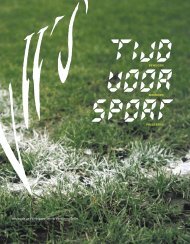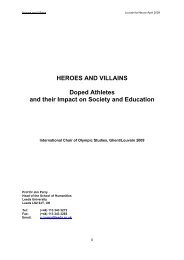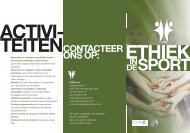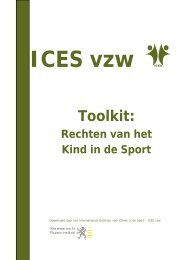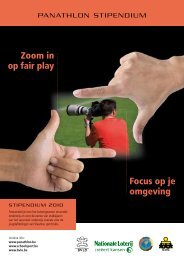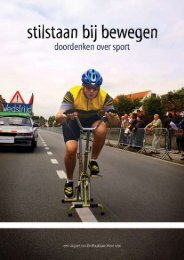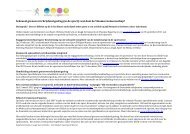Part 3 GLOBAL ISSUES: HARASSMENT AND ABUSE RESEARCH
Part 3 GLOBAL ISSUES: HARASSMENT AND ABUSE RESEARCH
Part 3 GLOBAL ISSUES: HARASSMENT AND ABUSE RESEARCH
Create successful ePaper yourself
Turn your PDF publications into a flip-book with our unique Google optimized e-Paper software.
variables:1) formation of the sport – team or individual; 2)<br />
amount of clothing coverage required for competition (a little, a<br />
moderate amount and a lot); 3) gender structure (male-or female<br />
dominated membership statistics); and 4) gender culture<br />
(masculine, gender-neutral or feminine), the female elite athletes<br />
who participated in masculine sports were the only group that<br />
was more harassed and abused than women in the other<br />
groups, particularly from peer athletes in sport v .<br />
Performance level also seems to be related to the amount of<br />
sexual harassment experiences. When the athletes were divided<br />
into two groups: those who had participated in a world<br />
championship and/or the Olympic Games, and those who had<br />
not, it turned out that the ‘best’ athletes had experienced more<br />
sexual harassment than the lower performance group. This was<br />
true primarily for those that were 19 year of age and older.<br />
There was no difference between the athletes and the controls<br />
when experiences of sexual harassment and abuse in sport<br />
were compared with similar experiences in school/at work.<br />
There was, however, a distinct difference between how many<br />
athletes (15%) who had experienced sexual harassment from an<br />
authority figure in sport compared with the control group’s<br />
experience of harassment from authority figures at work or in<br />
school (9%). This percentage was larger among the older<br />
subjects.<br />
The forms of sexual harassment that the athletes had<br />
experienced the most often were:<br />
“Ridiculing of your sport performances and of you as an<br />
athlete because of your gender or your sexuality (for<br />
example,’ soccer is not suitable for girls’)”<br />
“Unwanted physical contact, body contact (for example<br />
pinching, fondling, being kissed against your will, etc.”<br />
19




